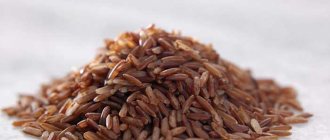Any menu compiled for a nutritious and healthy diet must contain fish. Mackerel is one of the most useful types of fish. The product has long been consumed as a main dish - soups, jellies were prepared from it, it was also stuffed and served as a side dish for main courses.
In addition to its excellent taste, fish contains a whole arsenal of vitamins and minerals, and the most valuable component is fish oil, which contains polyunsaturated fatty acids that prevent the increase in cholesterol and the formation of atherosclerotic and malignant tumors.
Despite the undoubted benefits, it is better to include mackerel in the menu after studying the basic rules of preparation and the possible harm to the body from consuming this seafood. The beneficial properties of the seafood product are revealed when used correctly, and also depending on how much a person consumes per day.
Chemical composition and benefits of mackerel depending on preparation
Mackerel, which contains useful components in its composition, as well as high molecular weight cholesterol, is necessary in the diet of heart patients, hypertensive patients, patients with atherosclerosis, oncology and thrombosis. Omega-3 takes part in all oxidative and metabolic processes in the body, and is also a natural powerful antioxidant that prevents cell mutation at the DNA level, which is a good prevention of the formation of cancer.
As a result of the influence of the beneficial components of mackerel on the body, the following changes occur:
- capillary and arterial membranes are strengthened and cleansed;
- joint and muscle pain disappears;
- migraine and headaches disappear;
- cell membranes are saturated with high molecular weight fats and amino acids;
- hormonal levels are regulated;
Vitamins in mackerel
- the functioning of the myocardium and blood flow system improves;
- the frequency and intensity of spasms decreases;
- the epidermis is rejuvenated and the hair structure improves;
- microcirculation of cerebral vessels improves, intelligence and memory increase;
- inert tissues in the human skeleton are strengthened;
- the index of glucose and cholesterol in the blood decreases.
Fish is useful for all pathologies, because it fills the body with essential acids and vitamins, and also helps to normalize the level of glucose in the blood. For dietary nutrition, mackerel must be cooked in the oven, and then simmered in a frying pan to remove the fat, which negatively affects the functioning of the pancreas.
Compound
This representative of the Scumbrieves has a rich biochemical composition. The main advantage is the presence of an Omega-3 and Omega-9 complex. The composition also contains the following components:
- vitamin complex – A, C, E, H, B vitamins – B1, B2, B3 (PP), B4, B5, B6, B9, B12;
- mineral set - magnesium and iron, phosphorus and chlorine, potassium and calcium, manganese and cobalt, iodine and copper, fluorine and molybdenum, chromium and zinc, selenium and sodium;
- 18 g of protein compounds;
- 13 g fat.
The biochemical complex of components in the product allows you to regulate all metabolic and oxidative processes in the human body.
Cold smoked
Cold smoked mackerel retains in its composition the same vitamin and mineral complex that is found in fresh fish. The harm from a smoked product is that when it is processed with smoke, a high concentration of mercury accumulates in the composition, which is dangerous in case of hypertension, cardiac pathologies, pregnancy and lactation.
If you consume cold smoked products, the amount of carcinogens in them is minimal, because pre-marinated fish is smoked for several days at a temperature of 10-15 degrees.
Hot smoked
Hot smoked products are most dangerous for people with pathologies of the myocardium and blood flow, as well as the digestive organs, liver and kidneys, because they are processed at a temperature of 110 degrees with liquid smoke. With this smoking scheme, a high concentration of phenol remains in the product, which is a highly toxic element for the body. In addition to the high concentration of carcinogens, the compound benzopyrene is formed, which, when regularly introduced into the human body, provokes cell mutations and forms malignant neoplasms.
The most dangerous smoked fish is that cooked over an open fire (bonfire), where the concentration of carcinogens exceeds the safe dosage by 200-300%. Such products often lead to intoxication of the body.
Salty
Salted fish also retains all the components necessary for the body - vitamins, mineral complex, protein compounds and Omega-3 fatty acids. When properly used in food, the salty product will also be beneficial for myocardial pathologies, improve arterial and capillary blood flow and protect the body from the formation of thrombosis and atherosclerosis.
Patients with:
- pathologies of the gastrointestinal tract;
- hypertension;
- pathologies of the kidneys and liver;
- disturbances in the functioning of the bladder and urological organs.
Calorie content and how much protein is in 100 g of fish
In 100 g of fresh product - 191 kcal, protein content - 18 g, fish oil - 13.2 g, saturated fatty acids - 4.2 g. Calorie content of mackerel after processing:
- fried in oil – 278 kcal;
- boiled in water – 211 kcal;
- steamed – 191 kcal;
- heat treatment by smoking method – 317 kcal;
- salted – 305 kcal;
- pickling method – 142 kcal.
The choice of processing method depends on taste preferences, as well as contraindications.
For example, for diseases of the liver, gastrointestinal tract, pancreas and obesity, steamed fish is a priority. Smoked and fried in oil should be present on the menu in small quantities and in the absence of contraindications, it is better not to include such dishes in the children's menu.
See also:
Brown rice - benefits and harms for weight loss, how to cook it correctly











